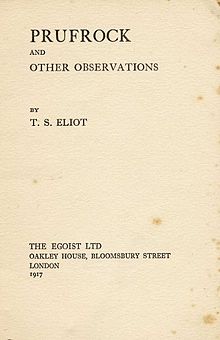The Love Song of J. Alfred Prufrock
| by T. S. Eliot | |
 |
|
| First published in | June 1915 issue of Poetry |
|---|---|
| Country | United States |
| Language | English |
| Publisher | magazine (1915): Harriet Monroe chapbook (1917): The Egoist, Ltd. (London) |
| Lines | 140 |
| Pages | 6 (1915 printing) 8 (1917 printing) |
| Read online | at |
"The Love Song of J. Alfred Prufrock", commonly known as "Prufrock", is the first professionally published poem by American-British poet T. S. Eliot (1888–1965). Eliot began writing "Prufrock" in February 1910, and it was first published in the June 1915 issue of Poetry: A Magazine of Verse at the instigation of Ezra Pound (1885–1972). It was later printed as part of a twelve-poem pamphlet (or chapbook) titled Prufrock and Other Observations in 1917. At the time of its publication, Prufrock was considered outlandish, but is now seen as heralding a paradigmatic cultural shift from late 19th-century Romantic verse and Georgian lyrics to Modernism.
The poem's structure was heavily influenced by Eliot's extensive reading of Dante Alighieri and makes several references to the Bible and other literary works—including William Shakespeare's plays Henry IV Part II, Twelfth Night, and Hamlet, the poetry of seventeenth-century metaphysical poet John Donne, and the nineteenth-century French Symbolists. Eliot narrates the experience of Prufrock using the stream of consciousness technique developed by his fellow Modernist writers. The poem, described as a "drama of literary anguish", is a dramatic interior monologue of an urban man, stricken with feelings of isolation and an incapability for decisive action that is said "to epitomize frustration and impotence of the modern individual" and "represent thwarted desires and modern disillusionment".
Prufrock laments his physical and intellectual inertia, the lost opportunities in his life and lack of spiritual progress, and he is haunted by reminders of unattained carnal love. With visceral feelings of weariness, regret, embarrassment, longing, emasculation, sexual frustration, a sense of decay, and an awareness of mortality, "Prufrock" has become one of the most recognised voices in modern literature.
...
Wikipedia
